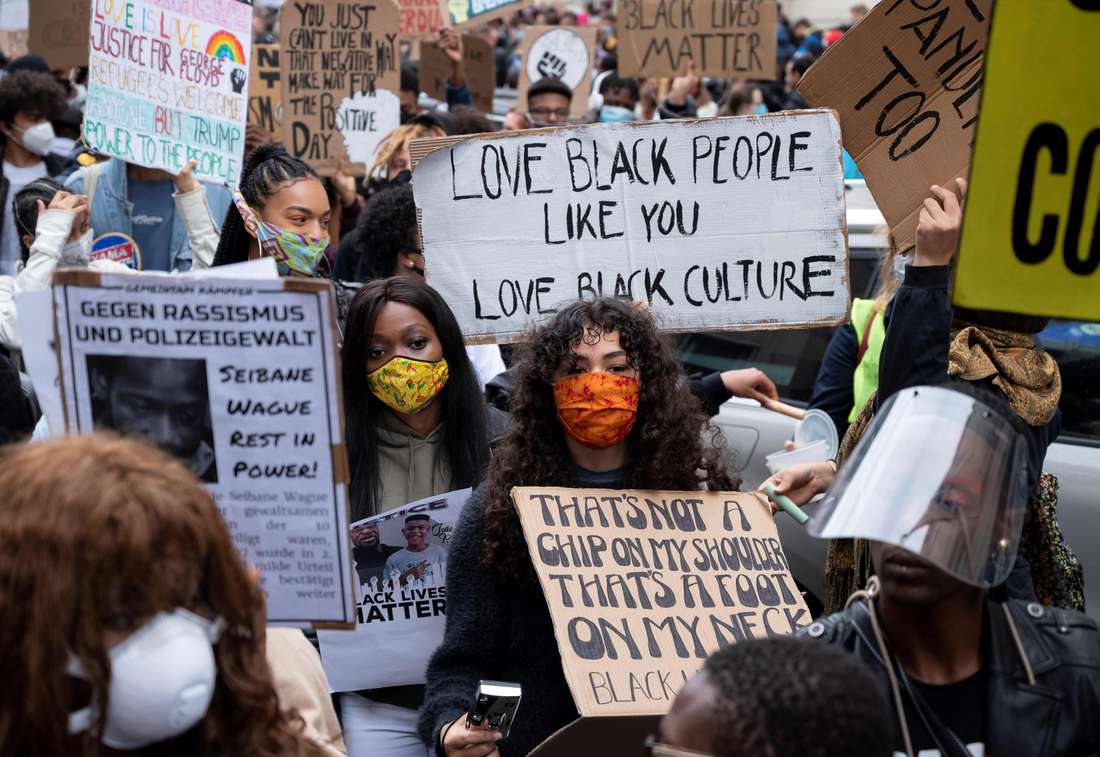Why so much apathy for police killings in Kenya?

Protestors take part in a demonstration on June 5, 2020 in Vienna, Austria, to show solidarity with the Black Lives Matter movement in the wake of the killing of George Floyd, an unarmed black man who died after a police officer knelt on his neck in Minneapolis. PHOTO | JOE KLAMAR | AFP
What you need to know:
- Kenyans joined Mr Ndiritu and the world in speaking out against police brutality and racism.
- On June 1, a homeless man in Mathare, known as Vaite to his neighbours, was walking home when a policeman shot him dead
Never let anybody say Kenyans are not a caring lot. Our collective empathy played out on a global scale this past week when we donated the “Haki Yetu” phrase for use in the #BlackLivesMatter demonstrations in the United States, which were sparked by the death of a black man, George Floyd, who was cuffed and asphyxiated by policemen.
Nobody can forget the infamous Alex Ndiritu from Nyeri who exported rage to America when, in replying to a post by CNN about the protests, urged Americans to “burn the White House”.
POLICE BRUTALITY
Kenyans joined Mr Ndiritu and the world in speaking out against police brutality and racism. Raila ‘Agwambo’ Odinga also Tweeted a Martin Luther King-inspired message about the same, and the irony of global versus local empathy did not escape anybody.
Beyond the apparent hypocrisies, the show of concern and solidarity was a beautiful example of what “If my brother’s in trouble so am I” looks like. One can only hope the support for #JusticeForGeorgeFloyd yields an everlasting change in race-inspired violence world over.
Like any other “hotbed of terror”, Kenya is no stranger to unlawful killings by policemen.
On June 1, a homeless man in Mathare, known as Vaite to his neighbours, was walking home when a policeman shot him dead. Moments earlier, policemen had shot in the air, ostensibly to disperse the residents and force them to adhere to the 7pm curfew.
Nobody seems to know Vaite’s real name but most Kenyans on social media have seen the graphic images of his body by now. As painful as it is to say it, even his death was not as significant as Mr Floyd’s.
The Independent Policing Oversight Authority (IPOA) reported that in enforcing the curfew, the police have to date killed 15 people and injured 31. Perhaps it’s bullet-proof jackets Kenyans need and not masks.
Vaite is just one of the 16 people shot dead every month by Kenyan police, according to the Deadly Force database run by the Nation Newsplex team.
The project monitors local media, social media and human rights and IPOA reports to track the demographics of each person killed by the police and the circumstances surrounding their deaths.
The number is most likely much higher, according to human rights groups, as 16 only accounts for the reported cases.
KILLINGS
Given that the unlawful killings are concentrated in the slums and low-income areas, one is tempted to conclude that while racism bites America, classism is what bites us at home.
The question then is: why is there so much apathy about what’s happening locally and so much empathy for events occurring thousands and thousands of kilometres away?
It shouldn’t be surprising, given how pervasive the American culture is in our lives: from the music, language, dressing to TV shows.
If this does not give any insights, then the police spokesman’s responses about police brutality during an interview with NTV certainly do.
Mr Charles Owino said police officers who were accused of brutality were “probably young and drunk from the little power they have”, adding that may have been provoked by errant civilians.
PROVOKED
Provoked? Maybe President Trump shared his script with him. Or vice versa. You can never tell these days.
If American novelist and activist Lydia Maria Child was alive today, she would tell Mr Owino that the US is a warning rather than an example to the world. Kenyans were rightly outraged by Mr Owino’s sentiments.
But the insights lie in what Mr Owino left unsaid: That the culture of violence from policemen in Kenya is so entrenched and normalised that not even a photo of a bloody body is enough to summon rage that could meet the proportions Mr Floyd’s death inspired. Certainly not enough rage to make the #JusticeforVaite hashtag trend for long, if that’s a valid measure.
The tragedy is that everything will soon be restored to factory settings as we separate ourselves from empathy and work ourselves back to the familiar story of policemen killing and maiming innocent people. What a pity.
Ms Oneya comments on social and gender topics. Twitter @FaithOneya; [email protected]





